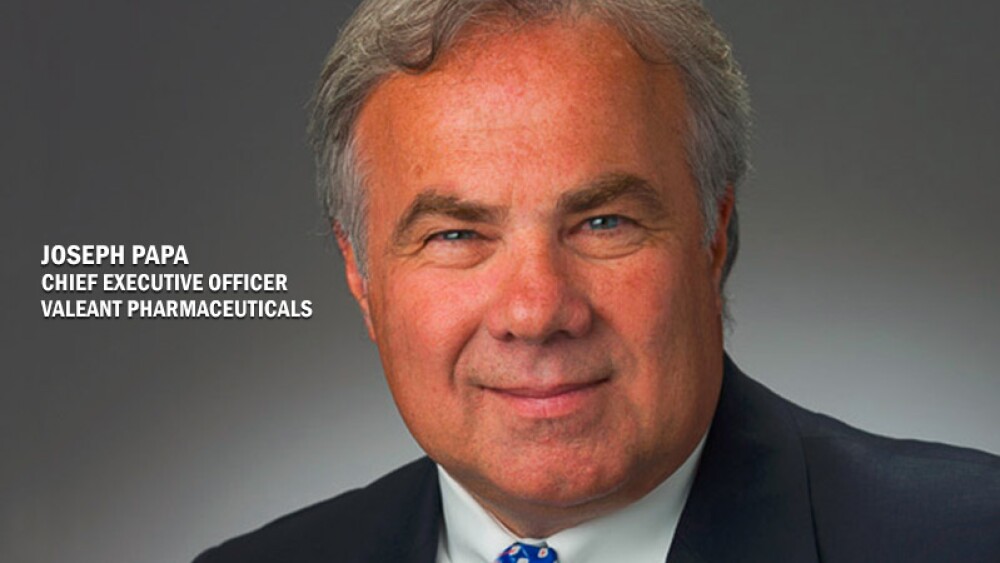August 8, 2016
By Mark Terry, BioSpace.com Breaking News Staff
Joe Papa, the new chief executive officer of Canadian company Valeant Pharmaceuticals International , is working a lot of angles to turn around the company, which is currently more than $30 billion in debt. The most recent rumor is that Papa and Valeant are considering selling off its constipation drug, Relistor.
Last month, the U.S. Food and Drug Administration (FDA) approved the tablet version of Relistor, which is used to treat constipation related to the use of opioids for chronic, non-cancer pain. Valeant markets the drug with Progenics Pharmaceuticals , and expects to begin selling the new formulation in the third quarter. The FDA approved an injectable version of the drug in 2008.
Progenics received a $50 million milestone payment from Valeant in late July after the FDA approval, and may receive up to $200 million in additional sales milestones. Analysts think that Relistor could bring in $400 to $500 million in sales.
On July 1, Valeant announced that it and UK-based AstraZeneca had amended Valeant’s license for plaque psoriasis drug brodalumab. That deal basically terminated Valeant’s rights to develop and commercialize the drug in Europe that had been part of a strategic partnership with AstraZeneca. LEO Pharma picked up the rights to brodalumab in Europe. No financial figures were disclosed. At the same time, Amgen will receive low single-digit inventory royalties related to brodalumab.
Also, LEO acquired the global license from AstraZeneca for tralokinumab. That drug is an anti-IL-13 monoclonal antibody that recently completed a Phase IIb clinical trial in patients with atopic dermatitis.
Valeant has been in considerable trouble—“embattled” is the word journalists seem to use the most—over its debt and business practices. Identified as a “serial acquirer,” the company bought over 100 companies since 2008. In 2014, William Ackman’s Pershing Square Capital Management and Valeant attempted a hostile takeover bid of Dublin-based Allergan . This led to a lawsuit by Allergan, as well as a U.S. Securities and Exchange Commission (SEC) investigation into insider trading.
In March 2014, Pershing Square bought up about 10 percent of Allergan stock, becoming its largest shareholder. In April 2014, Valeant and Pershing Square announced a joint bid for Allergan, which resulted in a 15 percent stock increase, which provided Pershing with $1 billion in gains overnight.
Valeant was also being investigated by the U.S. government over drug pricing and distribution practices. Citron Research, formerly StockLemon.com, wrote an incendiary report in October 2015 comparing Valeant to Enron and accusing it, among many things, of “channel stuffing.” Channel stuffing is using specialty mail-order pharmacies that Valeant controls to make it, according to CNBC, “prop up sales of its high-priced drugs and to keep patients and their insurance companies from switching to less costly generics.”
The company took a hard hit in January of this year when Pershing Square unloaded about 5 million Valeant shares on the last trading day of 2015. Ackman claimed he sold them to “generate a tax loss” for investors. It cut his stake in Valeant from 9.9 percent to 8.5 percent. Bidnessetc at the time noted that 2015 was a very bad year for Pershing Square, mostly driven by Valeant’s stock losses. “One of his funds posted a 19.7 percent loss through December 29, which, when compared to last year’s 40 percent gain, helps put things in perspective. Feeling a bigger responsibility to his funds’ investors, Mr. Ackman finally decided to make a move in their favor.”
In addition to Papa taking over for former Valeant chief executive officer Michael Pearson, Papa is in a position of restoring a company whose reputation was in tatters. There is some speculation that in order to pay off at least some of the debt, Valeant will consider selling off more assets than just a constipation drug. The biggest source of that speculation is Bausch & Lomb, which Valeant acquired in 2013 for $8.7 billion. Analysts think it would bring in as much as $12 billion.
In March, the Wall Street Journal wrote that Valeant was planning to change its basic business model in addition to admitting to errors in its earnings statements. And instead of defaulting on debt, it was proposing extending its deadlines with lenders.
Aside from Bausch & Lomb, there has been talk that Valeant could sell off separate business units of the company or the entire division. It’s also possible that the company’s surgical and generic units could be a better option without tearing up its strong eye care focus.





